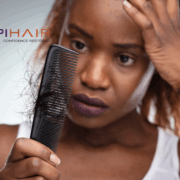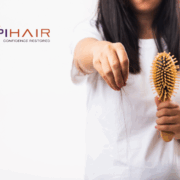Reasons Why Women’s Hair Loss in Nashville, TN
Solutions for Women’s Hair Loss – Find Support and Understanding
Hair loss can be a distressing experience for anyone, but for women, it can be particularly challenging. From hormonal changes to stress and genetics, there are numerous reasons why women may experience hair loss. Understanding the underlying causes is crucial in order to find effective solutions and regain confidence. In this comprehensive guide, we will delve into the various factors contributing to women’s hair loss and explore potential treatments available, aiming to provide valuable insights and guidance for women in Nashville, TN, and beyond.
Hormonal Imbalance
Hormonal fluctuations can play a significant role in women’s hair loss. Factors such as pregnancy, menopause, polycystic ovary syndrome (PCOS), and thyroid disorders can all lead to imbalances that affect hair growth cycles. During pregnancy, for example, elevated levels of estrogen can prolong the hair’s growth phase, resulting in thicker and healthier-looking hair. However, postpartum hormonal changes can cause an increased shedding of hair, leading to noticeable thinning. Similarly, the onset of menopause can lead to a decline in estrogen levels and an increase in androgen hormones, potentially contributing to hair loss. Understanding these hormonal shifts is essential in addressing the root cause of hair loss in women.
Genetic Predisposition
Genetics can also play a significant role in female hair loss. Androgenetic alopecia, commonly known as female pattern baldness, is a hereditary condition that can lead to gradual thinning of the hair. This type of hair loss typically follows a specific pattern, with the hairline receding and the crown area becoming progressively thinner. While the genetic predisposition to hair loss cannot be altered, various treatments and interventions can help manage its impact and maintain healthy hair growth.
Stress and Lifestyle Factors
Chronic stress and certain lifestyle choices can contribute to hair loss in women. High-stress levels can disrupt the hair growth cycle, leading to increased shedding and weakened hair follicles. Additionally, poor dietary habits, smoking, and excessive hairstyling or use of harsh chemical treatments can also take a toll on the overall health of the hair. Adopting stress-reducing practices, improving nutrition, and minimizing damaging hair practices can help mitigate these factors contributing to hair loss.
Medical Conditions and Medications
Certain medical conditions and medications can have a direct impact on hair health. Conditions such as alopecia areata, lupus, and trichotillomania can result in localized or widespread hair loss. Furthermore, medications used to treat conditions like cancer, arthritis, depression, and high blood pressure can also lead to hair thinning and loss as a side effect. It is important for women experiencing hair loss to consult with healthcare professionals to determine the potential influence of underlying medical conditions and medications.
Seeking Specialized Hair Restoration Solutions
In Nashville, TN, women experiencing hair loss can explore specialized hair restoration solutions to address their individual needs. Advanced technologies, such as platelet-rich plasma (PRP) therapy, low-level laser therapy, and follicular unit extraction (FUE) hair transplants, offer promising options for restoring hair density and rejuvenating the scalp. Consulting with experienced professionals in the field of hair restoration can provide women with personalized strategies tailored to their specific hair loss concerns.
Knowing the multifaceted nature of women’s hair loss is crucial for effectively addressing this common issue. ecognizing the diverse factors that contribute to hair loss, women can take proactive steps to explore suitable treatments and regain confidence in their appearance. Whether it’s managing hormonal imbalances, addressing genetic predispositions, or adopting healthier lifestyle practices, there are various pathways to achieving optimal hair health.











